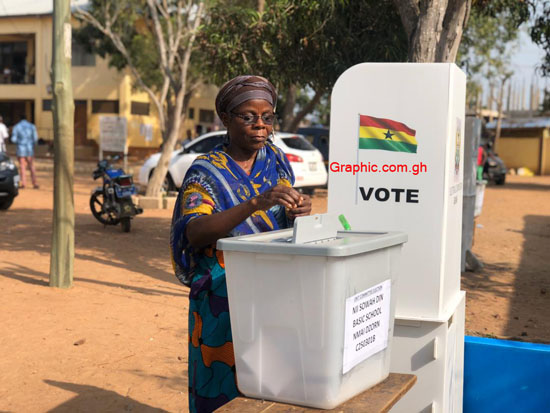
Vote buying in elections: The politician’s dilemma
The practice of vote buying during elections appears to be on the rise despite its criminalisation in Ghana.
Several prominent Ghanaians —including politicians — have lamented the increasing cost of running for political office.
Advertisement
A CDD-Ghana post-election survey in 2020 revealed that standing for presidential elections in Ghana costs a whopping US$100 million, while parliamentary elections cost at least US$ 693,000.
A significant portion of these shocking amounts is reportedly spent on the buying of votes, and this continues to undermine Ghana’s multiparty democracy.
The phenomenon of vote buying occurs at all levels of the national political electoral system and in both intra-and inter-party elections, especially within the two major political parties. Party executive elections, internal party primaries, presidential and parliamentary elections, to even the confirmation of MMDCEs by assembly members, have all been characterised by vote buying.
Although a number of notable political leaders, including the current Speaker and the Majority Leader of Parliament, have decried vote buying, there seems to be no decline in the rate at which votes are bought on a large-scale during elections. This flawed system is obviously crippling to many politicians, who have complained bitterly about it. For instance, Mr Joseph Mensah, former MP for Kwesimintin in the Western Region, who admitted to paying bribes to delegates in the 2020 NPP parliamentary primaries during a corruption watch expose was reported to have said:
“It is true we had to save some money and give them some little thing to induce [the delegates] to vote for you. It is normal in our politics now… I’m highly against it, but that is the system we’re operating now. I’ve been in Parliament for only a term, and I witnessed when the NDC was going for the primaries. It has become the highest bidder gets the nod. I’ll not shy away from this.” (Ghanaweb, 12th July, 2020)
Why then do many Ghanaian politicians still engage in vote-buying? Using the game theory concept of Prisoner’s Dilemma, which attempts to explain why two rational individuals may choose not to cooperate even if it appears to be in their best interests to do so, this article argues that it is rational for individual election candidates to engage in vote buying even though it is not in the collective interest of politicians and the society.
Consider two candidates competing for parliamentary primaries. Each candidate has a certain chance of winning: Candidate One has A per cent chance of winning while Candidate Two has B per cent chance of winning. For each candidate, there is also the option to bribe delegates in order to increase the chances of winning by X per cent, and each candidate can decide to either pay the bribe or not.
If both candidates decide not to pay the bribe, they would both revert to their original chances of winning the election. However, if one candidate pays the bribe and the other does not, his or her chance of winning increases by X per cent as the other’s chances reduce by the same. In such a game, the dominant strategy for each candidate is to act in their own self-interest and pay the bribe: this would guarantee each candidate his initial chance of winning (A per cent or B per cent) and improve his chances by X per cent.
From a moral standpoint, both candidates choosing to pay the bribe does not yield the optimal outcome for society. Neither does this choice yield the optimal outcome even economically, since if both candidates pay the bribe, it essentially brings the two of them back to their original chances of winning the elections. Thus paying the bribe earns them the same results they would have achieved without the bribes. (The analysis makes the simplistic assumption that each candidate pays the same amount and it has the same effect on voters). However, because neither candidate can trust that the other would refrain from paying the bribe if he also did so, the two candidates refuse to cooperate and pay the bribe, though it is not in their collective interest in the end.
This illustration offers useful lessons in understanding the conduct of politicians in vote buying. First, vote-buying in elections is primarily rooted in mistrust among candidates; any proposals to stop the phenomenon must, therefore, address the issues of trust — even if not of other candidates, of the electoral system. Secondly, it is evident that vote-buying can only be effectively curtailed when the perceived benefits of paying bribes are minimised and/or the perceived risks associated with vote-buying are increased. Attempts to erase the perceived benefits from vote-buying in Ghana may be hampered because of the significant illiteracy and poverty among the electorate, whose focus on short-term benefits even at the expense of longer-term gains is often pronounced.
There is, therefore, the need to focus on increasing the risks associated with vote buying. This can be achieved by strengthening the regulatory environment within which elections are contested. Parliament must certainly work at buttressing existing laws on election and campaign finance to strictly deter vote-buying. The Ghana Police Service must also be resourced and empowered to enforce these laws during elections, beginning with the arrest and prosecution of offenders where necessary. Not only would this serve as a deterrent to actors in our political system; it would also increase politicians’ confidence in the electoral environment and assure them that they would not be penalised by the system for opting not to pay bribes. This will go a long way to strengthen Ghana’s democracy.
The writer is a researcher, AFI, Institute for Security Studies, Pretoria.




